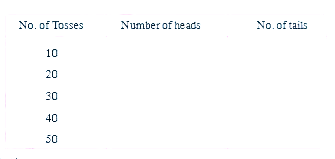Write the coefficient of x3 in each of the following
(i)x3+x+1
(ii) 2−x3+x2
(iii)√2x3+5
(iv) 2x3+5
(v) π2x3+x
(vi) −23x3
(vii) 2x2+5
(viii) 4Solution in Bengali
The correct Answer is:(i) 1
(ii) -1
(iii) √2
(iv) 2
(v)π2
(vii) −23
(vii) 0
(viii) 0
Step by step video, text & image solution for Write the coefficient of x ^(3) in each of the following (i) x ^(3) + x +1 (ii) 2- x ^(3) + x ^(2) (iii) sqrt2 x ^(3) + 5 (iv) 2x ^(3) +5 (v) pi/2 x ^(3) +x (vi) - 2/3 x ^(3) (vii) 2x ^(2) +5 (viii) 4 by Maths experts to help you in doubts & scoring excellent marks in Class 9 exams.
Topper's Solved these Questions
- BOOK - NCERT BANGLISHCHAPTER - POLYNOMIALS AND FACTORISATION EXERCISE - EXERCISE 2.26videos
POLYNOMIALS AND FACTORISATION
- BOOK - NCERT BANGLISHCHAPTER - POLYNOMIALS AND FACTORISATION EXERCISE - EXERCISE 2.39videos
POLYNOMIALS AND FACTORISATION
- BOOK - NCERT BANGLISHCHAPTER - POLYNOMIALS AND FACTORISATION EXERCISE - TRY THESE6videos
POLYNOMIALS AND FACTORISATION
- BOOK - NCERT BANGLISHCHAPTER - LINES AND ANGLES EXERCISE - THINK, DISCUSS AND WRITE3videos
LINES AND ANGLES
- BOOK - NCERT BANGLISHCHAPTER - PROBABILITY EXERCISE - DO THIS3videos
PROBABILITY
Similar Questions
Find the value of the polynomial 4x2−5x+3, at
(i) x=0
(ii) x=−1
(iii) x=2
(iv) x=1202:04View SolutionFind the remainder when x3+3x2+3x+1 is divided by the following Linear polynomials:
(i) x+1
(ii) x−12
(iii) x
(iv) x+π
(v) 5+2x02:26View SolutionWrite a polynomial with 2 terms in variable x.
05:25View SolutionWhat is the difference between intersecting lines and concurrent lines ?
02:10View SolutionToss a coin for number of times as shown in the table. And record your findings in the table.

What happens if you keep on increasing the number of tosses.View SolutionThe value of |[a,a+d,a+2d] , [a+d,a+2d,a+3d] , [a+2d,a+3d,a+4d]|+|[b
View SolutionArrange the following compounds in the decreasing order of the boiling point:
CH3BrI CH3CH2BrII CH3CH2CH2BrIII
CH3CH2CH2CH2Br06:04View SolutionThe SN1 reactivity of the following halides will be in the order:
(i) (CH3)3C−Br
(ii) (C6H5)CHBr
(iii) (C6H5)2C(CH3)Br
(iv) (CH3)2CHBr
(v) C2H5BrView SolutionIn CH_(3)CH_(2)Br,% of Br is
04:55View SolutionPredict all order of reactivity of the following compounds in dehydrohalogenation. a,. I. CH_(3)CH_(2)CH_(2)CH_(2)Cl II. (CH_(3))_(2)CHCH_(2)Cl III. (CH_(3))_(2)CH - CH_(2)Br IV. CH_(3)CH(Br)CH_(2)CH_(3) V. (CH_(3))_(3) C - Br b. I. CH_(3)CH(Br)CH_(3) II. CH_(3)CH_(2)CH_(2)Br III. (CH_(3))_(2) CH - CH_(2) Br IV. (CH_(3))_(3)C - CH_(2) Br
02:52View SolutionArrange the following compounds in increasing order of acidity.
(i) CH3CH(Br)CH2COOH
(ii) CH3CH2CH(Br)COOH
(iii) CH3CH2C(Br)2COOH
(iv) CH2BrCH2CH2COOH01:41View SolutionWhich one of the following is more reactive towards SN2 mechanism.
((CH3)3C−Br). ((CH2)3CH−Br). ((CH3)CH2−Br). (CH_3-Br).01:03View SolutionComplete the following reactions :
(i) CH3−CH2Br+KOH(aqueous)Boil−−→X+Y
(ii) CH3−CH2Br+NH3→X+Y01:42View SolutionThe number of reactions proceeding through free radical mechanism are
(i) C2H5Br+Na+−OCH3
(ii) C2H5Br+AgCN
(iii) C6H5CH3+Cl2(hv)
(iv) CH3CH=CH2+HBr (peroxides)
(v) C2H5Br+alc.KOH
(vi) CH3CH=CH2+HCl(peroxide)
(vii) C2H5Br+H2(NiorPd)
(viii) C2H6+Cl2(hv)
(ix) C2H5Br+NaSHView SolutionWrite the coefficient of x2 in each of the following br> (i)15−3x+2x2
(ii) 1−x2
(iii) πx2−3x+5
(iv)√2x2+5x−102:10View SolutionWrite the coefficient of x2 in each of the following br> (i)15−3x+2x2
(ii) 1−x2
(iii) πx2−3x+5
(iv)√2x2+5x−101:38View Solution

